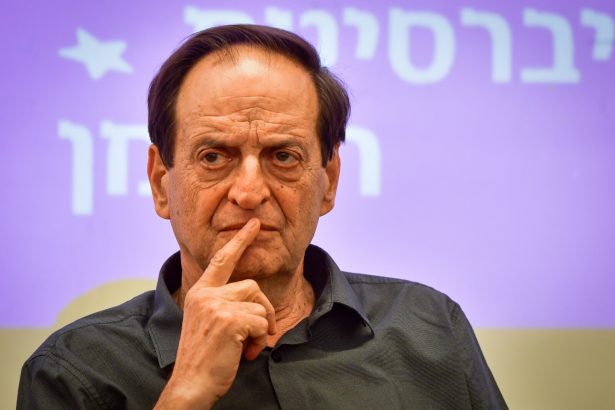Former Likud Justice Minister Dan Meridor discusses what he sees as the erosion of liberal values within the party, Benjamin Netanyahu’s messiah complex, and the dangerous attacks against Israel’s Supreme Court. ‘Because in Israel, the parliament elects the government, the government generally controls the parliament, and the Prime Minister controls both, the only truly independent branch is the judiciary’ argues Meridor.
‘If an Israeli political leader says “I am for human rights, rule of law and democracy”’ Dan Meridor tells me, ‘he is considered a leftist. Yet these words – human rights, rule of law and democracy – were Menachem Begin’s words, day after day. These values and the rules of the game are no longer accepted.’
It is a cold, sunny January afternoon, soon after Benjamin Netanyahu’s sixth government has been sworn in and I am sitting in the library of former Likud Minister Dan Meridor in his family house in the Rechavia neighbourhood of Jerusalem. The books lining the shelves bear testament to Meridor’s interests and influences. One entire row is taken up with the works of Revisionist leader Vladimir Jabotinsky. The row below is full of biographies of Menachem Begin – who Meridor often reminisces about during our conversation. Another section has the writings of former Supreme Court Justices Aharon Barak and Menachem Elon. Elsewhere one can see the works of Maimonides, and two sets of the Talmud.
In the days before the government was sworn in, the media began reporting details of the coalition agreements and ministerial appointments. Itamar Ben Gvir, a former student of Meir Kahane, demanded and received a beefed up ‘National Security Ministry’ with control over the Border Police. Avi Maoz, of the deeply homophobic Noam party, holds a position within the Prime Minister’s Office. Far-rightist Bezalel Smotrich was appointed to a sensitive post relating to Israel’s handling of the Palestinian population in the West Bank. Smotrich’s party was also outspoken in seeking to change both the composition of Israel’s Supreme Court and the Knesset’s ability to override its decisions. Religious Zionist party’s Simcha Rothman, now the new chair of Knesset law committee emphasised that the maximum number of MKs necessary for such an override clause would be 61, an absolute majority in the Knesset (and the generally the minimum number of MKs any coalition government is comprised of). Meanwhile a demand raised by Ben Gvir, to legislate the removal of a clause forbidding those considered racist from standing for the Knesset, was also agreed by Netanyahu.
Contesting Basic Values
For Meridor, the new government is the result of the erosion of previously agreed rules of the game. ‘The Zionist movement that established Israel’ Meridor begins, ‘was a national movement comprised of several different ideological groups including zealots convinced they were right and other peoples’ positions would lead to disaster. We had major differences of opinion on a host of issues. And we didn’t have a constitution – I don’t think Ben Gurion wanted other people telling him what to do.’ In this context, Israel made progress by creating some sort of consensus regarding certain key pillars. ‘We succeeded because we agreed on two important aspects. One was basic values such as democracy, human rights and the rule of law. The second was the rules of the game – that every Israeli votes, and when the court decides we accept it regardless of whether we like it.’ Meridor emphasises that anti-democratic forces were always present in Israel. But they remained on the periphery rather than in positions of influence.
What is unprecedented, says Meridor, is that these basic values and rules are now being contested. ‘They are considered leftist, bordering on treacherous,’ he relates.
The Likud party was originally a national and liberal party. It has changed
When Meridor discusses the erosion of liberal values within the Likud party, he is speaking as an insider – perhaps one of the ultimate insiders. Considered one of Likud’s former ‘princes’ he is the product of several generations raised in the Revisionist movement led by Vladimir Jabotinsky and later Menachem Begin. Meridor has as one might say in Yiddish, yichus.
In 1939 as a 16-year-old, Dan’s mother Ra’anana joined Beitar. Meridor’s Russian-born father Eliyahu had become active in Beitar in Poland and came to Mandatory Palestine with his mother and sister. He was subsequently arrested by the British and spent time imprisoned in Acco and Latrun. In 1944 he was exiled to a detention camp and sent to Eritrea, Sudan and Egypt. Upon his release he became Commander of the Irgun in Jerusalem. Following Israel’s establishment, he was amongst the founders of the Herut movement, and chaired its Jerusalem branch.
‘Likud’s origins are from the nationalist-liberal Herut party’ says Meridor and its DNA is comprised of these two ideas [Likud’s full name is the Tnua Leumit Liberalit the National Liberal Movement]. Maintaining the balance between them was seen as crucial. That is why Likud was traditionally both tough on security and also supportive of the Supreme Court. This has changed.’
Meridor bemoans what he sees as a clear drift of the party away from those origins. ‘I doubt many of the 32 Likud MKs would describe themselves as liberal’ he says. ‘Likudniks are not fighting for the legal system or human rights. Instead, it is just the nationalist component, and with it comes hatred towards elites and leftists. The liberal cause is defending the other – I don’t see that in today’s Likud.’
The legitimisation of Kahane’s ideological descendants
As a MK, Meridor played a crucial role in the outlawing of Meir Kahane’s Kach party in 1988. ‘We in Likud initiated legislation that someone who incites racism couldn’t run for Knesset and I collected all the material showing Kahane was a racist in order to ban him’ Meridor relates. In those days it was neither particularly controversial nor an issue of left-wing or right-wing. Menachem Elon, the religious Deputy Chief Justice of the Supreme Court compared Kahane’s proposals to the worst amongst the nations of the world. ‘Kahanism was kicked out of legitimate discourse’ Meridor states. ‘And that was accepted by the public.’
I wrote about Ben Gvir’s rise onto the national stage and the reasons behind it in a separate Fathom article. They included the global rise of the far-right populist leaders, and Ben Gvir’s success in tapping into many Israelis’ fears following the riots in Jewish-Arab mixed cities in May 2021. For Meridor, a large component of what facilitated his increased popularity was Netanyahu. ‘Netanyahu legitimised Ben Gvir because he needed the votes’ he says. ‘He coalesced with people who were totally illegitimate for a coalition (even if the court allowed them to run). Now there’s a coalition which includes racists. This is a totally different value system to the past.’
It’s not that Netanyahu loves Israel less; he just loves himself more
Meridor has literal and figurative ‘history’ with the Prime Minister. He resigned as Finance Minster in 1997, asserting that Netanyahu was forcing him out. It is several years since Meridor (and Benny Begin, Menachem’s son) stopped voting for Likud. But over the decades Meridor has also spent hundreds of hours in Netanyahu’s company. ‘Netanyahu is an intelligent and knowledgeable man compared to other politicians’ Meridor states. ‘Yet when all is said and done, it is politics, or his personal political standing, that determines his decisions.’
He certainly does not think Netanyahu can compare himself with the great Israeli leaders. ‘Ben Gurion and Begin were of a different calibre. When they left office people genuinely wondered how things would continue. Yet the sky won’t fall if there will be someone else instead of Netanyahu.’
It seems that what grates at Meridor is Netanyahu’s prioritising of political survival. ‘It’s not that Netanyahu is unpatriotic; after all he served in the elite Sayeret Matkal unit. But as Brutus in Shakespeare’s Julius Caesar says, “not that I loved Caesar less, but that I loved Rome more”, so it’s not that Netanyahu loves Israel less, he just loves himself more.’ At its core this relates to Netanyahu’s feeling that only he can save the country, which means anything that ensures his continuation of leadership is fair game. Meridor believes there is all too often a blurring of the personal and national agendas. ‘What comes across from his autobiography is that he thinks he is there to save Israel. So prioritising political survival is logical because politics makes you a PM. There is a psychological merging of the state with himself. He feels that if he’s not there no one else can do it. This is very dangerous.’
‘The Supreme Court is less activist than its predecessors’
Meridor sees this trend of illiberalism within Likud and attacks on the Supreme Court as accelerating during Netanyahu’s tenure primarily due to his legal troubles. ‘Netanyahu wasn’t necessarily a guardian of the legal system, but he was never against it and didn’t allow extreme proposals to pass in the system’ Meridor explains. ‘He had good relations with the Chief Justices of the Supreme Court.’ But once the Police Commissioner began investigating Netanyahu on charges of fraud, breach of trust and bribery, the sitting Prime Minister went into conspiracy mode. ‘Netanyahu charged that the police chief, state attorney and attorney general were all leftists cavorting with the media to kick him out office. He said openly that he heard the judges were leftists and that they should prove otherwise. When these sorts of things are said by a Prime Minister and repeated for years, many people believe it and it is very damaging.’
Few Israelis have held such a wide range of positions in the political system as Meridor. He was Cabinet Secretary under Menachem Begin and Yitzchak Shamir between 1982-84. He was Minister of Justice 1988-92 and was subsequently appointed Finance Minister by Netanyahu in 1996. In Ariel Sharon’s government he served as Minister without Portfolio. After a time out from politics, Meridor later served as Minister of Intelligence and Atomic Energy, and Deputy Prime Minister (again under Netanyahu) between 2009-2013.
As a former Justice Minister, Meridor’s views on accusations of an overly activist Supreme Court are fascinating. A recent article published in Fathom in support of the override clause describes Israel’s judiciary as being self-appointed, unelected, operating without any effective checks, balances or supervision, and running the country based on their own vision of what is good and reasonable. In 2015, lawmaker Motti Yogev famously said a D9 bulldozer should be used against the Court. Those who share his ideological worldview now hold key positions in the coalition. They see their chance.
Meridor admits there are legitimate critiques of the court; ‘it’s only natural in such a huge and powerful system there will be mistakes.’ But one must distinguish between those looking to change and those looking to destroy. ‘The current attack is from those using a D9’ he says. ‘The word reform is inaccurate – they want to deform, to weaken it and totally delegitimise it.’
Meridor also takes aim at the oft-heard narrative that in the 1990’s the court led by Aharon Barak began to become more activist and appropriated powers for itself. ‘The court in the early decades of the state was very more powerful and courageous, especially against Ben Gurion,’ says Meridor. ‘They said “you aren’t the ones who can decide to close the Communist party newspaper [Kol Ha’am]. You can’t decide on security alone. When it comes to balance of security and human rights we decide.’”
For Meridor the so-called constitutional revolution of the 1990s was nothing of the sort. ‘The decision and restraint by the Supreme Court was there the whole time. What Barak and others did was to give the philosophical justification of the role of the court in a democracy as a check and balance to the power of government and Knesset.’
Another allegation by critics is that the consequences of the Basic Law for Human Dignity and Liberty, which was passed by the Knesset on 17 March 1992 by 32 votes to 21, were not fully understood at the time by lawmakers, and this subsequently undermined some components of the Jewish nature of the state. ‘No one understood?’ Meridor asks incredulously. ‘There were huge debates! The fact we couldn’t get more rights including equality and freedom of speech in the law was specifically because they understood the consequences’
Indeed, as a Likud Minister of Justice in those years, Meridor initiated that legislation. Throughout 1989, 17 meetings of the Ministerial Committee of Legislation were held. Meridor intended something far more comprehensive – a Basic Law on Human Rights and a Basic Law on Legislation both of which passed through a preliminary reading in the Knesset with widescale support. Yet the collapse of the unity government and the next Shamir government’s reliance on the ultra-Orthodox parties buried these plans. The Basic Law on Legislation never got passed (the current government seeks to pass its own version of this). The 1992 Basic Law for Human Dignity and Liberty was a deeply watered-down version of Meridor’s Basic Law for Human Rights which had originally included the values of equality and freedom of speech. ‘The Basic Law Human Dignity was a compromise because we couldn’t get through something more comprehensive’ he explains.
Without a constitution and without the British tradition
‘When one combines the ideological commitment and statements made by the coalition parties with Netanyahu’s attempt to get immunity from prosecution, and add the absence of a constitution or tradition like Britain, it is indeed worrying,’ cautions Meridor. Indeed, a mere three days after we met, the new Likud Justice Minister Yariv Levin laid out what he described as four specific elements of this first stage of his planned judicial reform, which he said was aimed at ‘strengthening democracy, rehabilitating governance, restoring faith in the judicial system, and rebalancing the three branches of government.’ These changes include: altering the composition of the Judicial Selection Committee; legislating an override clause with a majority of 61 MKs and explicitly preventing the High Court from deliberating and ruling on Israel’s Basic Laws; forbidding the court from using a test of “reasonableness” against which to judge government decisions; and allowing ministers to appoint their own legal advisers, instead of getting counsel from advisers operating under the Justice Ministry aegis.
Meridor – who was not surprised by these proposals – was at pains to emphasise that an independent court is crucial to maintaining checks and balances. ‘Because in Israel, the parliament elects the government, the government (by coalition governments) generally controls the parliament, and the Prime Minister controls both, the only truly independent branch is the judiciary,’ he says. ‘The role of these gatekeepers – the justices, the Attorney General and legal advisors – is to restrain the government from determining policy without any limits which prevents corruption and the unchecked infringement of human rights. The new government is trying to destroy this balance,’ he warns. ‘If these ideas get implemented it will be a major shift. Israel will become a different country.’





































So according to the has-been Meridor, Bibi publicly saying he heard the judges were leftists and that they should prove otherwise is “damaging,” the absence of a constitution or tradition like Britain is “worrying,’ and recalibrating power to the citizens’ sensibilities is “destroy[ing] balance.”
To whom? Sour-grapes Meridor? Who’s been making the rounds (here, the Cambridge Union,. etc.) saying, “things were so much better when I mattered.”
Is this even a story?